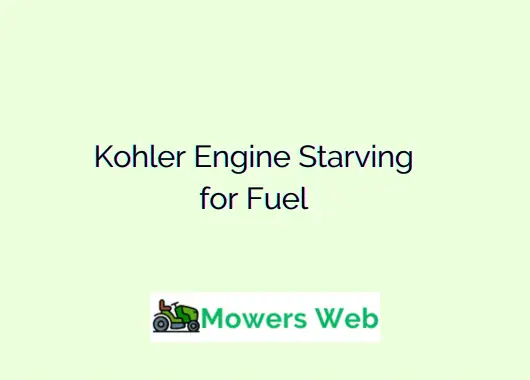When you rely on your Kohler engine to power equipment or machinery, it can be frustrating to encounter fuel-related issues. A Kohler engine running out of fuel is one issue that users frequently experience.
This issue can lead to decreased performance, stalling, and even damage to the engine if not addressed promptly.
In this post, we will explore the possible causes of a fuel-starved Kohler engine, troubleshooting steps to identify the problem, and effective solutions to get your engine running smoothly again.
Let’s dive in.
Kohler Engine Starving for Fuel
Before diving into the causes, it’s crucial to identify the symptoms of a fuel-starved Kohler engine. Some common signs include:
1. Engine Stalling
The engine may stall frequently or struggle to stay running, indicating a fuel supply problem.
2. Power Loss
A fuel-starved engine might experience a significant loss of power, leading to decreased performance.
3. Rough Running
You may notice that the engine runs erratically, with irregular idling or rough operation.
4. Difficulty Starting
Starting the engine becomes difficult or requires multiple attempts, indicating a lack of fuel reaching the combustion chamber.
Read Kohler V-Twin Throttle Linkage(3 Quick Ways To Fix)
Causes of Kohler Fuel Starvation
Several factors can contribute to a Kohler engine starving for fuel. Understanding these causes is vital to finding the appropriate solution.
1. Clogged Fuel Filters
One of the primary culprits behind fuel starvation is a clogged fuel filter. Over time, debris, dirt, and contaminants can accumulate in the fuel filter, restricting the flow of fuel to the engine.
2. Fuel Line Issues
Cracked, kinked, or damaged fuel lines can disrupt the fuel supply, leading to insufficient fuel reaching the engine.
3. Carburetor Problems
A faulty or improperly adjusted carburetor can disrupt the fuel-air mixture, resulting in poor engine performance.
4. Fuel Pump Malfunction
A malfunctioning fuel pump fails to deliver an adequate amount of fuel to the engine, causing it to starve for fuel.
5. Fuel Tank Ventilation
If the fuel tank doesn’t vent properly, a vacuum can form, preventing fuel from flowing to the engine.
Read Kohler Engine Dies After 30 Minutes(7 Quick Ways To Fix)
Troubleshooting Kohler Fuel Starvation
When faced with a fuel-starved Kohler engine, a systematic approach to troubleshooting can help pinpoint the issue:
1. Inspect the Fuel filter.
Check the fuel filter for clogs or signs of damage. If it appears dirty or blocked, replace it with a new one.
2. Examine the Fuel lines.
Inspect all fuel lines for cracks, kinks, or leaks. Replace any damaged lines and ensure they are correctly connected.
3. Carburetor Inspection
Clean the carburetor thoroughly and ensure it is adjusted according to the manufacturer’s specifications.
4. Test the Fuel pump.
Check the fuel pump’s functionality by measuring the fuel pressure. If it is below the recommended levels, consider replacing the fuel pump.
5. Verify Fuel Tank ventilation.
Ensure that the fuel tank cap is venting correctly. A faulty vent can lead to fuel starvation, especially during extended use.
Read Kohler Engine Spewing Liquid out of Breather(Solved)
Solutions to Fuel Starvation
Based on the troubleshooting results, here are some effective solutions to address a Kohler engine starving for fuel:
1. Regular Maintenance
Perform regular maintenance on your engine, including replacing fuel filters and cleaning the carburetor, to prevent fuel starvation issues.
2. Use High-Quality fuel.
Always use high-quality, clean fuel to avoid clogs and fuel system problems.
3. Keep Fuel Lines in Good Condition.
Inspect and replace fuel lines as needed to ensure a steady fuel supply to the engine.
4. Carburetor Adjustment
If you have the technical know-how, adjust the carburetor properly to optimize the fuel-air mixture.
5. Professional Servicing
If troubleshooting and basic maintenance don’t resolve the issue, seek help from a qualified technician to diagnose and fix complex fuel system problems.
Read Kohler 7000 Series Review(Read This Before You Buy)
Kohler Engine Maintenance Tips
| Maintenance Task | Frequency | Description |
|---|---|---|
| Oil Change | Every 25 hours of use | Replace the engine oil with the recommended type and grade. |
| Air Filter Inspection | Every 25 hours of use | Check the air filter for dirt and debris, clean or replace as needed. |
| Spark Plug Replacement | Every 100 hours of use | Replace the spark plug to ensure proper ignition. |
| Fuel Filter Inspection | Every 100 hours of use | Inspect the fuel filter for clogs, replace if necessary. |
| Cooling System Check | Every 100 hours of use | Ensure the cooling system is functioning correctly. |
| Ignition System Check | Every 100 hours of use | Inspect the ignition system for any issues. |
| Valve Clearance Check | Every 200 hours of use | Check and adjust valve clearance if required. |
| Clean Engine Fins | Every 200 hours of use | Clean debris and dirt from the engine fins to prevent overheating. |
| Fuel System Maintenance | Every 200 hours of use | Clean the carburetor and check fuel lines for proper flow. |
| Cylinder Head Inspection | Every 300 hours of use | Inspect the cylinder head for signs of wear or damage. |
| Throttle and Choke Check | Every 300 hours of use | Ensure the throttle and choke are functioning correctly. |
| Fuel Stabilizer Usage | Seasonal | Add fuel stabilizer to the tank if storing the engine for an extended period. |
| Governor Adjustment | As needed | Adjust the governor to maintain the engine’s RPM settings. |
| Muffler Inspection | As needed | Check the muffler for obstructions or damage. |
| Cooling Fins Inspection | As needed | Regularly inspect the cooling fins for blockages. |
| Compression Test | As needed | Perform a compression test to check engine health. |
Read Kawasaki Liquid Cooled Engine Problems(7 Quicks Ways To Fix)
Kohler Command Not Starting
1. Insufficient Fuel
Possible Cause:
One of the most common reasons for an engine not starting is a lack of fuel in the system. This can happen due to an empty fuel tank or a clogged fuel filter.
Troubleshooting Steps:
- Check the Fuel level. Ensure that there is an adequate amount of fuel in the tank. If the tank is empty, refuel before attempting to start the engine.
- Inspect the Fuel filter. A clogged fuel filter can restrict the flow of fuel to the engine. Check the filter for dirt and debris, and if necessary, clean or replace it.
- Fuel Quality: Verify that you are using clean, fresh fuel without any contaminants that could clog the fuel system.
2. Faulty Spark Plug
Possible Cause:
A faulty or worn-out spark plug can prevent the engine from igniting the fuel-air mixture, leading to a no-start situation.
Troubleshooting Steps:
- Remove the Spark Plug: Take out the spark plug from the engine using an appropriate spark plug wrench.
- Check the Spark Plug Condition: Examine the spark plug for signs of damage, wear, or fouling. If it appears worn out or covered in carbon deposits, replace it with a new one.
- Set the Correct Gap: If you are reusing the spark plug or installing a new one, ensure that the electrode gap is set to the manufacturer’s recommended specifications.
3. The engine floods
Possible Cause:
Frequent or improper attempts to start the engine can cause it to flood with excessive fuel, making ignition difficult.
Troubleshooting Steps:
- Wait for a While: If you suspect the engine is flooded, wait for a few minutes to allow excess fuel to evaporate.
- Use the Choke Correctly: When starting a cold engine, use the choke as recommended in the engine manual. Avoid overusing it, as it can lead to flooding.
Read Kawasaki FH531V Replacement Engine(10 Best Alternatives)
4. Dead Battery or Faulty Starter
Possible Cause:
A dead or weak battery or a faulty starter can prevent the engine from cranking.
Troubleshooting Steps:
- Check the Battery: Verify the battery’s charge using a voltmeter. If the voltage is low, recharge or replace the battery as needed.
- Inspect the Starter: If the battery is in good condition but the engine doesn’t crank, the starter motor may be faulty and require replacement.
5. Safety Interlock Issues
Possible Cause:
Modern Kohler engines come equipped with safety interlock systems that prevent starting under certain conditions. If a safety interlock is engaged, it can stop the engine from starting.
Troubleshooting Steps:
- Review the Manual: Familiarize yourself with the safety interlock system as described in the engine manual.
- Check Safety Features: Verify that all safety switches, such as seat, brake, and blade engagement switches, are in the correct position and functioning properly.
Read Briggs and Stratton 21 HP Platinum Engine Problems(With Solutions)
Final Remarks
A Kohler engine starving for fuel can be a frustrating experience, but with proper understanding and troubleshooting, you can identify and resolve the underlying issues.
Regular maintenance, high-quality fuel, and attentive care are essential to keeping your engine running smoothly and efficiently.
Read Powermore 420cc Engine Problems(With Solutions)
FAQs
Can bad fuel quality cause fuel starvation in a Kohler engine?
Yes, using low-quality or contaminated fuel can lead to clogs and fuel system issues.
Why does my engine stall after running for a while?
The engine may stall due to a partially blocked fuel filter or a malfunctioning fuel pump.
Is it necessary to replace the fuel filter regularly?
Yes, regular fuel filter replacement is crucial to maintaining proper fuel flow and preventing starvation.
Can I clean the carburetor myself?
If you have the necessary skills, cleaning the carburetor is possible, but it’s essential to follow proper procedures.
Read Briggs and Stratton Engine Bogs Down Under Load(Solved)




